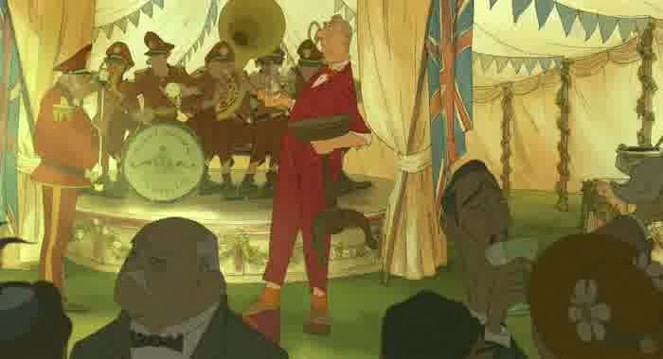Sinopsis(1)
A finales de los años 50, una revolución sacude el universo del music-hall: los espectáculos tradicionales protagonizados por acróbatas, malabaristas y ventrílocuos se consideran pasados de moda por el gran público, seducido porel carisma de las jóvenes estrellas de la música rock. El ilusionista no deja de comprobar día a día que lamentablemente pertenece a una categoría de artistas en vías de desaparición. Cada vez es más raro conseguir firmar un contrato, por ello se ve obligado a abandonar las grandes salas parisinas y parte con sus palomas y su conejo a probar suerte presentando su número de magia en Londres. Pero la situación es la misma en el Reino Unido, y se resigna entonces a actuar en los pequeños teatros, fiestas al aire libre, cafés, y en el pub de un pueblo de la costa oeste escocesa. Allí conoce a Alice, una joven que aún posee la capacidad de asombro característica de la infancia, la cual cambiará su vida para siempre. Ella todavía ignora que le ama como a un padre; él siente que la ama como a su hija. Del encuentro de estas dos soledades nacerán momentos mágicos y tiernos, que les marcarán para siempre. (Sherlock Films)
(más)Reseñas (3)
Tati’s non-aggressive style of comedy, when Mr. Hulot often disappears somewhere in the mis-en-scéne, has been elevated to the level of the main theme in The Illusionist. The protagonist stands at the edge of the picture and edge of interest. If he doesn’t find a kindred spirit in a dreaming girl, no one will notice him; he is almost invisible. As with Hulot’s magic, with Tati everything is always hidden somewhere around the corner while also being omnipresent. The comedy arises from seemingly (given that this is an animated film, really seemingly) random situations – the wind blows open a wind and it starts raining. The gags do not show off their sophistication, but simply just happen. Chomet opens before us several doors at once and doesn’t warn us in advance that someone is coming through them. Just as Tati creates a particular situation and leaves it to develop and reverberate. He doesn’t rush, though the average shot length is obviously (even without using a stopwatch) shorter than in any of Tati’s three masterpieces. He references not only those (for example, the contents of the washed car’s trunk remind us of Mr. Hulot’s Holiday), but also the wrongfully ignored Traffic (the deluge of black umbrellas) and the circus-themed made-for-TV movie Parade. The reference that shines through most in the film, however, is My Uncle, whose plot The Illusionist paraphrases. There is more definitiveness this time only in Hulot’s final passing of the baton. His yielding of space to the youth inside him is marked with both bitterness and hope. The illusionist leaves, but the illusions – at least the cinematic ones – remain. Chomet doesn’t change Tati in his own likeness. He retains the characteristics of Mr. Hulot as an old-fashioned element that is sometimes disruptive in the modern world and who understands children but not technology, but he allows him to look at himself from the outside (literally in the scene from the cinema). I consider the most eloquent aspect of this virtually silent tribute to the last of the masters of slapstick to be the parallel micro-story of a sullen, world-weary clown who is more fascinated by the movement of machines than by the movement of living beings. Alone, neither human nor inhuman, not fitting in anywhere. I believe that Tati felt something similar. 85%
()
Beautifully mournful, but it's not Chomet. I understand that it is (and logically had to be) in Tati's spirit, but that is no reason to completely abandon that much poetic "Chomet-like" surrealistic bizarreness that makes a genius a genius.
()
At first glance, Chomet seems to have calmed down compared to his most famous film (yes, I mean The Triplets of Belleville), giving up on his lively caricature-like drawings. He tames his creative flight to adapt a foreign substance and film a melancholic story of an aging entertainer who does not fit into the new rushed era, and dedicates his remaining energy to a poor girl, opening up to her the world of the big city from which he escaped to the countryside. The cabaret magician with a rabbit, essential props, and a supply of proven unchanging tricks is forcefully pushed off the stage by loud rock and roll and new techniques that offer greater miracles than the worn-out master. He has no home, and no future, and the present looks increasingly hopeless. Only nostalgia and memories of better times remain. The slow pace in this case does not matter because it corresponds to the chosen film aesthetics and subject. Overall impression: 80%.
()

